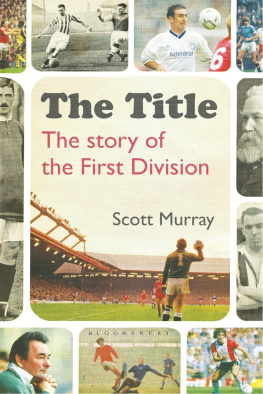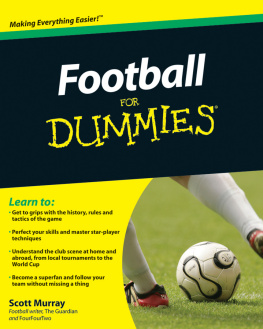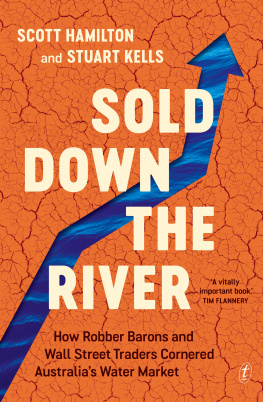Scott Murray - The Title: The Story of the First Division
Here you can read online Scott Murray - The Title: The Story of the First Division full text of the book (entire story) in english for free. Download pdf and epub, get meaning, cover and reviews about this ebook. year: 2019, publisher: Bloomsbury Publishing, genre: Detective and thriller. Description of the work, (preface) as well as reviews are available. Best literature library LitArk.com created for fans of good reading and offers a wide selection of genres:
Romance novel
Science fiction
Adventure
Detective
Science
History
Home and family
Prose
Art
Politics
Computer
Non-fiction
Religion
Business
Children
Humor
Choose a favorite category and find really read worthwhile books. Enjoy immersion in the world of imagination, feel the emotions of the characters or learn something new for yourself, make an fascinating discovery.
- Book:The Title: The Story of the First Division
- Author:
- Publisher:Bloomsbury Publishing
- Genre:
- Year:2019
- Rating:3 / 5
- Favourites:Add to favourites
- Your mark:
- 60
- 1
- 2
- 3
- 4
- 5
The Title: The Story of the First Division: summary, description and annotation
We offer to read an annotation, description, summary or preface (depends on what the author of the book "The Title: The Story of the First Division" wrote himself). If you haven't found the necessary information about the book — write in the comments, we will try to find it.
The Title: The Story of the First Division — read online for free the complete book (whole text) full work
Below is the text of the book, divided by pages. System saving the place of the last page read, allows you to conveniently read the book "The Title: The Story of the First Division" online for free, without having to search again every time where you left off. Put a bookmark, and you can go to the page where you finished reading at any time.
Font size:
Interval:
Bookmark:

The Title is going to take a place of honour next to my absolute favourite sports books written over the years. Im sure that George Plimpton, John Feinstein, Roger Kahn and Nick Hornby will appreciate Scott Murray's company.
thelondoneconomic
Scott Murray is one of Britains most talented sports writers and in The Title he is at his best. Meticulously researched, affectionate and often very funny, this account of the first century of English football gives the lie once and for all to the idea that the beautiful game began with the Premier League in 1992.
Dan Jones, Evening Standard columnist and bestselling historian
Richly colourful, heartfelt and, most of all, fun.
Jonathan Wilson, author of Inverting the Pyramid
Scott Murray is one of the great unsung heroes of British sports writing and this book shows why: witty, warm and with a keen eye for the all-important - and frequently amusing - detail.
Dan Davies, award-winning author
A breezy overview of the top division If you were reading for a degree in football history it would be a great place to start.
When Saturday Comes
A lovingly crafted chronicle written in a style that brings even Victorian footballers to life ... Engrossing and informative.
Sunday Mirror
A fine history ... goes into considerable factual and anecdotal detail on an era-by-era basis ... Such a history could be pretty dry, but not in the hands of Murray.
Backpass
Marvellous book, a treasure for any fan of the game.
Budapest Times
A witty, well-informed history.
Choice
An illuminating book on the history of the First Division.
Blackpool Gazette
Dedicated to the memory of Sandy Murray and the Nethy Bridge side of the 1950s, three-in-a-row Strathspey & Badenoch title winners.

Contents
Its been a long old trek, and I couldnt have carried the bags on my own. Thanks to Rob Smyth, Rob Bagchi and Paul Doyle for being sounding boards extraordinaire. Thanks to James Dart and Philip Cornwall at the Guardian for not forgetting about me. Thanks to Ian Preece for his eagle eye. Thanks to Nicola Barr at Greene & Heaton for her patience, advice and support. Thanks to Charlotte Atyeo at Bloomsbury for her belief, guidance and expertise. Thanks to Holly Jarrald and Charlotte Croft for guiding the ship into the harbour. Thanks to Neal and Brenda Mitchell for all the encouragement, golf and pimento cheese. Thanks to my mum, for reasons too obvious to explain. And thanks to Wendy for the love that makes me the richest man in town. Thanks, everyone!
Football began in 1992. Its one of the great running jokes, variations on a theme trotted out by the patter merchants whenever a caption is flashed up on the television: highest scorer in Premier League history, biggest-ever Premier League away win, most miles run by a player in a Premier League match. A wry, knowing nod to an awkward fact: that the self-styled greatest league in the world hasnt always been the top division of English football; that these records, while correct by strict definition, should really stretch a wee bit further back than year zero. To 1888, in fact, so we can factor in the years when the First Division of the Football League was the ultimate prize. That period in time, to borrow another zinger from the banter boys, before Sky invented football.
Its not as though histories of the English game completely avoid reference to events preceding the genesis of the Football Associations great usurper. Herbert Chapmans all-conquering Arsenal, five-time winners of the First Division during the 1930s, are still one of the most famous sides in the sport. Ditto the Busby Babes and the Manchester United of Best, Law and Charlton; Don Revies Leeds; Brian Cloughs championship sides at Derby and Forest; the domineering Liverpool of the seventies and eighties. But these are the rule-proving exceptions, and the century-long story of the old First Division, starring all those glorious winners (Preston! Sunderland! Manchester City!) and abject losers (Glossop! Orient! Manchester City!) has been curiously underrepresented. That was already the case decades ago, when the Football League was still the top prize; now were over a quarter of a century into the brave new Premier League era, the epic saga of the Football League is in danger of being lost completely in the vague mists of time.
This cannot stand! So heres an attempt to snatch the long-forgotten tale of the First Division back from the darkness, shine a light in a few corners, and give it the love and attention it so richly deserves. Homer will have nothing on this odyssey.
Introduction:
Old Mac pours a cup of coffee (206bc to 188889)
Tsu Chu was invented in ancient China, a pastime popular among the genteel elite of the Han dynasty. The game was played on the courts of the imperial palace, where nimble athletes of both sexes would attempt, with their elegant, privileged feet, to caress a ball made of feathers through a hole in a silk sheet suspended between bamboo poles. The goal swayed softly in the breeze. Close your eyes and drift away: you can almost hear the wind flicking the branches of the cherry blossom, the delicate oscillations of a wood flute, the ethereal glissando of the chimes.
Two millennia later, the British got involved and... what ho! Theres a voluminous, rumbling, cartoon cloud of dust with arms, legs, fists, stovepipe hats and big degenerate hobnail boots sticking out of it. Hey, were nothing if not passionate.
It was a perfect storm. A craze for organised sport swept Victorian Britain, thanks partly to the invention of the lawn mower, which meant folk didnt require a flock of sheep to maintain and manicure playing fields, and partly to recent child-labour legislation, which ensured a modern generation spent their formative years gambolling rather than working up chimneys. In particular, a mania for the strangely beguiling practice of hoofing a ball around took hold, and a battle for control of this new game soon raged.
In 1846, some blue-sky thinkers at Trinity College, Cambridge, took a first pass at some standardised rules, and set about wrapping their fingers like bindweed around the administrative tiller. Some more salt-of-the-earth types from Sheffield committed a few laws of their own to parchment in 1860. They went as far as forming the worlds first football-only clubs, Sheffield and Hallam, everything that came before having been affiliated to public schools, universities or cricket clubs. But the southerners refused to cede control, regaining the momentum in 1862 when J.C. Thring, one of the young dandies behind the Trinity College gambit, tweaked his old work into a new set of laws called The Simplest Game. A year later, a gaggle of public-school hoorays met in a Covent Garden drinker, buffed up Thrings rewritten rulebook, and the Football Association and Association Football was born!
The FA and Sheffield codes co-existed for a while, but the FA were better equipped to print and send out copies of their rulebook, and the 1871 launch of their eponymous Challenge Cup was the killer blow. Sixteen teams from across Britain entered the tournament. The favourites for the first FA Cup were Queens Park of Glasgow, who since forming in 1867 had yet to concede a goal in competitive play. They didnt let one in during their FA Cup run either, though that enviable defensive record wasnt enough to secure them the trophy. Queens Park had been given a bye to the semi-finals, at which point they would face Wanderers formerly Forest-Leytonstone, the London club of FA secretary Charles Alcock at The Oval cricket ground. The match ended goalless. Queens Park turned out their pockets to find nothing but brass bawbees, hope and dust; with no money left for food or board, they were forced to withdraw and head back home. Nobody appears to have considered a replay in Glasgow. Wanderers went on to beat Royal Engineers in the first final. Queens Park finally let one slip past the keeper three years later in a Hampden friendly against Vale of Leven. Some defence, but they never won the Cup.
Font size:
Interval:
Bookmark:
Similar books «The Title: The Story of the First Division»
Look at similar books to The Title: The Story of the First Division. We have selected literature similar in name and meaning in the hope of providing readers with more options to find new, interesting, not yet read works.
Discussion, reviews of the book The Title: The Story of the First Division and just readers' own opinions. Leave your comments, write what you think about the work, its meaning or the main characters. Specify what exactly you liked and what you didn't like, and why you think so.











![Scott Murray [Scott Murray] - Interactive Data Visualization for the Web, 2nd Edition](/uploads/posts/book/120518/thumbs/scott-murray-scott-murray-interactive-data.jpg)

